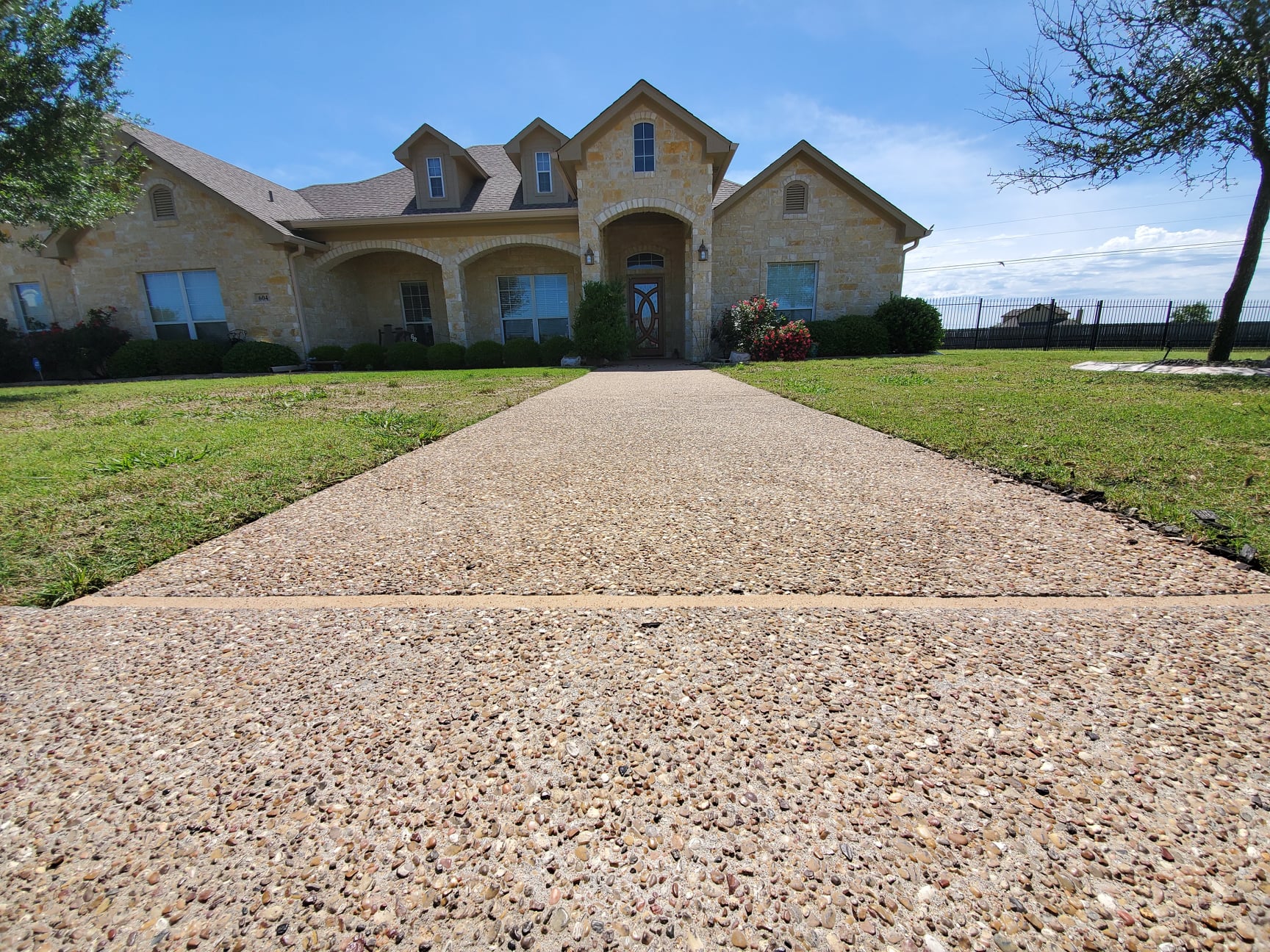
Concrete is a durable, low-maintenance, and affordable material, which is why many property owners use it for their driveways, patios, walkways, and other surfaces. However, this doesn’t mean concrete won’t accumulate stains over time. As a residential or commercial property owner, it’s important to understand concrete cleaning basics so you can keep your concrete driveway looking like new for a long time.
Below, we’ve listed some useful tips to keep in mind when cleaning and maintaining your concrete surfaces.
Preparing Your Driveway for Concrete Cleaning
Before you start your concrete driveway cleaning project, make sure you remove any items from the area. You’ll also need to inspect the surface for cracks or chips and make the necessary repairs first. If you’re washing your outdoor patio, the potted plants and furniture must be removed before you start cleaning.
The materials you’ll need will depend on what kind of stain you’re dealing with, but these are the items generally used for concrete cleaning:
- Leaf blower or vacuum
- Broom
- Laundry detergent
- Vinegar
- Baking soda
- Trisodium phosphate (TSP)
- Garden hose or pressure washer
- Stiff nylon-bristled brush
How to Clean Concrete Floors
STEP 1: Prepare the Concrete To Be Cleaned
If you’re working with an indoor surface like your basement floor, prep the area by removing any houseware, furniture, appliance, or other items. You’ll be using cleaning solutions later on, so it’s best to keep objects that can be affected away from the site as early as now.
On the other hand, you can ready your concrete driveway or patio by sweeping dried leaves and vacuuming loose dirt off the surface. You can also opt to use a leaf blower to remove grit and gravel. Finally, make sure to remove and treat weeds growing in cracks.
STEP 2: Spot Treat Stains
Stains can be removed using liquid laundry detergent and water. Simply pour a little detergent directly onto the area to be treated and scrub it using a stiff nylon brush. Make sure to let the detergent sit for at least 10 seconds before rinsing.
You may want to use absorbent materials like cat litter if you’re dealing with stubborn oil stains. Spread the product over the oil spill and leave it for 15 minutes; for blemishes that have dried already, it’s best to let it set overnight. After it has absorbed the oil, remove the litter using a broom and dustpan.
For rust stains, using diluted vinegar can do the trick. Pour the solution on the stain and let it soak for 20 minutes before scrubbing and rinsing.
STEP 3: Pressure Wash the Surface
Once the stains have been taken care of, you can scrub the entire surface using a commercial or homemade concrete cleaner and a nylon-bristled brush. You can also use a pressure washer for a faster and easier way to apply the cleaner.
After letting the cleaning solution sit for at least 5 minutes, rinse away thoroughly with clean water and let the surface dry.
STEP 5: Seal Your Concrete To Prevent Stains
Once you’re happy with your concrete driveway’s fresh new look, you can take things a step further by applying a concrete sealer. Sealing your surface helps repel spills, making it easier for you to remove stains in the future. Sealers also help keep dirt, grime, and grease from penetrating the concrete’s pores, preventing them from damaging your paving material.
Important Pointers
For your concrete driveway cleaning project to be successful, you’ll need to know your concrete’s type of finish. The best and safest methods to clean unsealed concrete will differ from those for sealed, polished, or painted concrete surfaces.
When Cleaning Unsealed Concrete Floors
As the name suggests, unsealed concrete floors are surfaces made from poured concrete without additional treatment. As a result, they are more prone to staining and can also be difficult to clean.
For stubborn stains, you can clean unsealed concrete surfaces with a commercial cleaner or trisodium phosphate.
When Cleaning Sealed Concrete Floors
Sealed concrete floors are coated with epoxies, acrylic resins, penetrating silicates, or urethanes, making them stain-resistant. Considering this, you may be able to eliminate stains using warm water mixed with dishwashing liquid or liquid detergent. Using harsh cleaners is not recommended, as these can damage the sealant.
When Cleaning Polished Concrete Floors
When working with polished concrete floors, you’ll want to take care not to damage the surface’s protective coating. To do this, it’s best to use a pH-neutral commercial cleaning solution when mopping your floors. Avoid using bleach or vinegar to remove stains, as the acidity can damage the concrete and take the shine off its surface.
When Cleaning Painted Concrete Floors
Cleaning painted concrete floors can be tricky since you have to remove stains from the surface without damaging the color. To clean your painted floor safely, you can use a non-abrasive all-purpose cleaner combined with warm water. Then, slightly dampen a microfiber mop with the solution to clean the floors without leaving too much moisture.
Once done, mop the floor with clean water and let the surface dry.
Get Better Results With the Help of Professionals
Concrete offers many attractive benefits, but it’s also a porous material that’s prone to accumulating dirt and stubborn stains. Before oil spills, grime, and other substances dry wreak havoc on your concrete surfaces, it’s best to make concrete cleaning a habit.
If doing your own concrete cleaning isn’t an option, know that you also have the option of hiring professionals to take care of your concrete driveway for you. While you can take the DIY route and follow the instructions mentioned, you can get better, lasting results by enlisting professional surface cleaning services.
When you are dealing with a worn out driveway, The Driveway Company is here to step in and breathe new life into your concrete surfaces. Contact us today and let our experienced team tackle dirt, moisture, moss, and other environmental elements affecting your driveway!